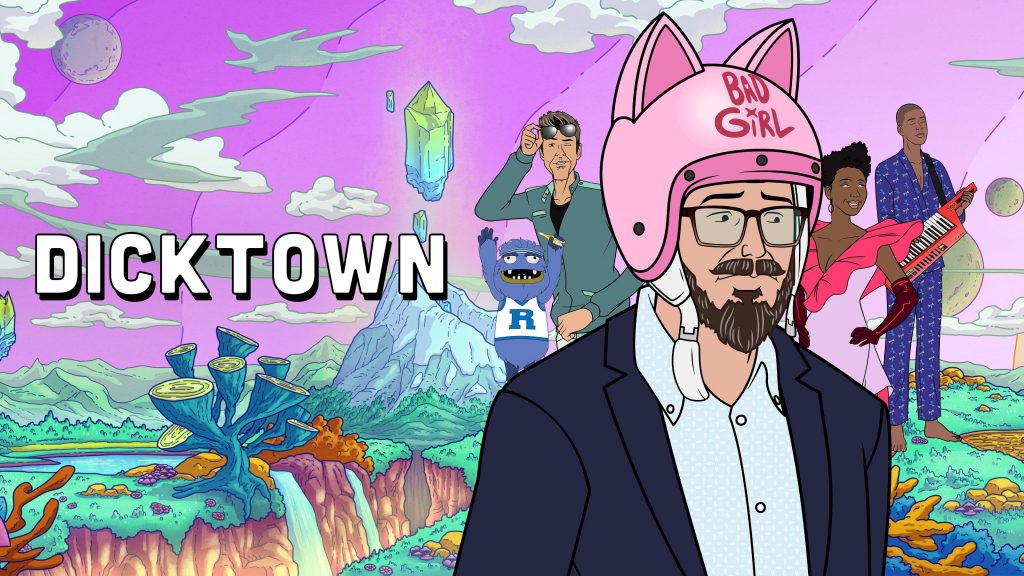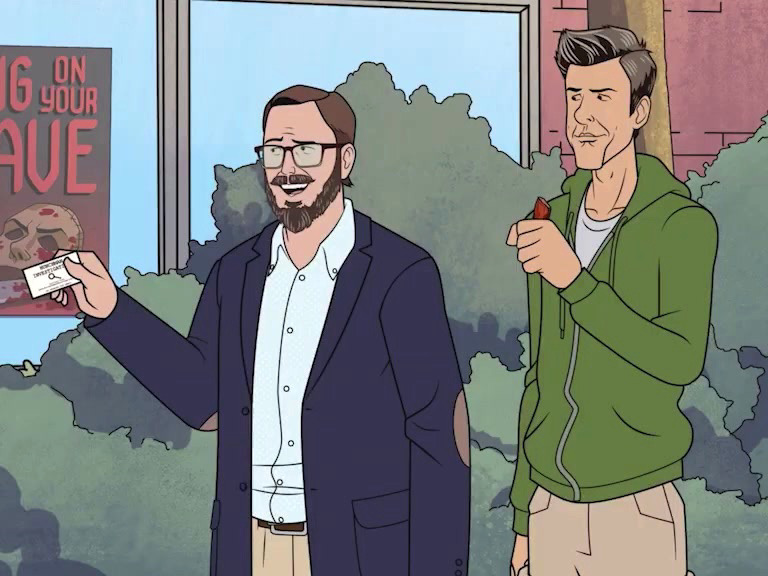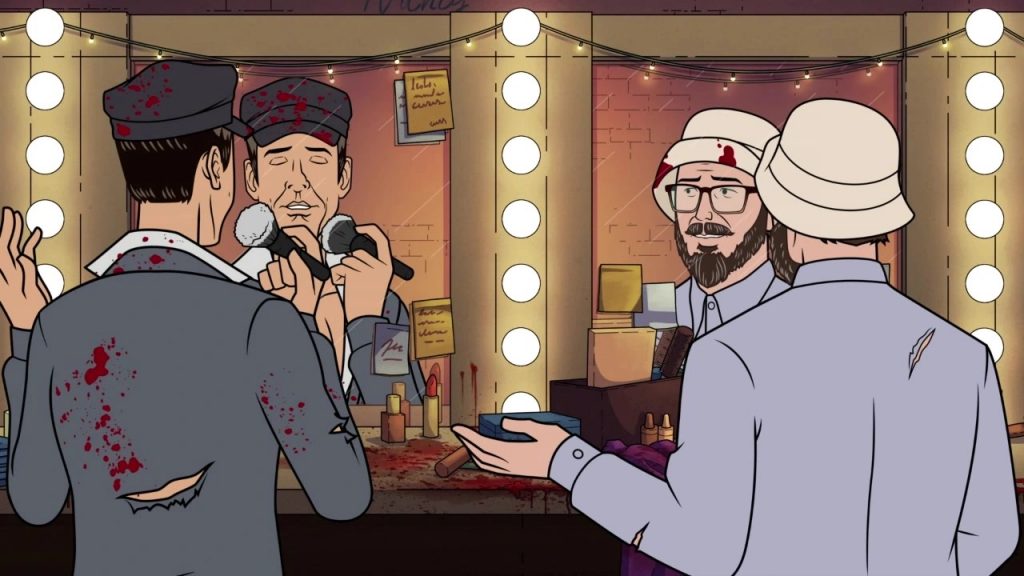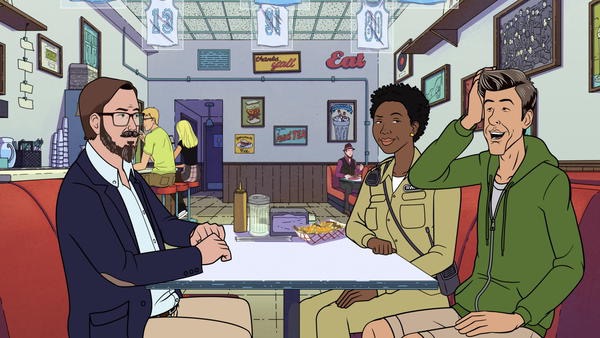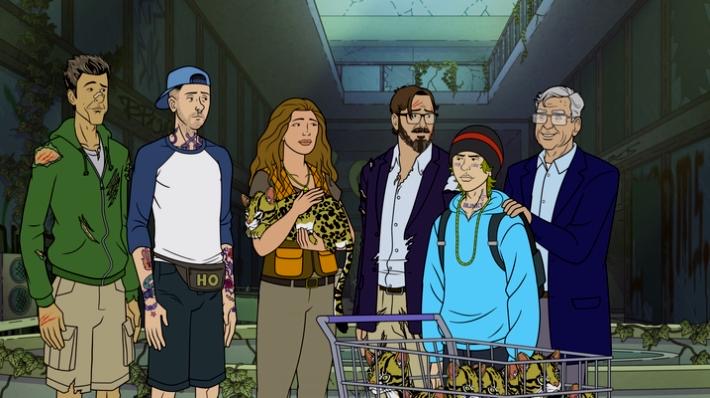Growing up—and knowing when you have grown up—is a hard thing to reckon with. When do you feel like a grown-up? What are the benchmarks of being a full-fledged adult—if there are any? Are we all just play-acting at pretending to know what we’re doing?
These are all difficult questions; even more difficult if you’re a former boy detective who solved mysteries for teens and is still solving mysteries for teens as an adult. John Hunchman and his former bully-turned-hired muscle David Purefoy grapple with existential crises—in a hilarious way, I promise—in the animated series Dicktown, now streaming on Hulu. Dicktown, created by writer and actor John Hodgman (Coraline, The Areas of My Expertise) and humorist David Rees (Going Deep with David Rees, Get Your War On), delves into these issues and more, with a whole host of characters who test the limits of Hunchman and Purefoy’s maturity and (hopefully) help them evolve at the same time.
On the cusp of season 2 of Dicktown, I spoke Mr. Hodgman and Mr. Rees recently about the conceit of Dicktown, how millennials and Generation Z are unfairly maligned, growing up, and stealing adult magazines.
FS: Before we start, I just want to say what a big fan I am of yours and the show, so thank you. This is a treat.
JH: Oh, the treat is ours. Tell me, where are you from?
FS: Kentucky. You can tell from my voice.
JH: It’s a wonderful lilt. I’ve never been to Kentucky. Have you, David?
DR: I feel like as a kid, but not as an adult, I don’t think.
JH: There are four commonwealths in the United States: Kentucky, Massachusetts, and—
DR: Hawaii?
JH: Pennsylvania. And then Virginia.
DR: The Virginia Commonwealth University. DCU.
JH: Well, great talking to you. Good commonwealth talk. [laughs] Jed, do you know the name of the Richmond college basketball team?
FS: I think I’m going to crap out.
JH: The Richmond Crap Outs?
DR: The Richmond Spiders.
FS: The Richmond Spiders? Really?
DR: Yeah, they show up in the NCAA tournament every so often.
JH: I’m looking it up right now, Jed; he’s telling the truth. Isn’t that interesting?
So, how can we help you? We made a show called Dicktown and we’d love to tell you all about it. [laughs]
FS: I would love to talk about Dicktown. For folks who might not be familiar with the show, what is your elevator pitch for Dicktown? What is the conceit of the show?
JH: Dicktown is the animated TV show that we decided to call Dicktown that follows the misadventures of John Hunchman, a former famous boy detective, in a town called Richardsville, North Carolina, a.k.a. Dicktown to the locals. John was once a famous boy detective, but now is a sad, middle-aged man who’s still mostly solving mysteries for teenagers. David Purefoy is John’s former bully and high school nemesis who is now also pushing middle-age and has become John’s driver, hired muscle, and unlikely friend.
And this odd couple—that’s a reference to a classic TV show [laughs]—this odd couple, if you will, solves mysteries throughout this wacky southern town while also trying to solve the real mystery; that is, why the Hell these two guys are friends.
DR: I can live with that.
JH: Trying to solve the real mystery of what it means to grow up.
DR: Especially in season 2. In season 2, that’s the real mystery. What are grown-ups?
FS: How do you become grown-ups? How do be friends? How do relationships evolve?
JH: Yeah, you got it, Jed. You understand. How is it possible to be a grown-up even though you’re just 30- to 50-years old? [laughs]
FS: So, David, I’m assuming this show is based on real life and yours and John’s adventures solving mysteries, correct? [laughs]
DR: Kind of. We’re playing exaggerated versions of ourselves and we’re drawing things from our own lives to create these fictional characters. And John and I have known each other for 20-some years now, right?
JH: Yes, correct.
DR: So, the timeline sort of makes sense in terms how long those guys have known each other. I guess they’ve known each longer than [John and I] have.
JH: Right, and also they’re a little younger than we are. The real-life stuff is that David and I are friends. I don’t think we’re unlikely friends. But we definitely identify with Hunchman in that I was a bookish, nerdy child who didn’t get outdoors that much. And David has some similarities with David Purefoy in that, although he has his nerd stripes, for sure, he has a big personality—
DR: A former bully—
JH: A former bully—
DR: Obnoxious at times.
JH: And you understand sports, which I don’t.
DR: I understand more sports than you do. That’s not a high bar to cross. [laughs] I grew up in the church, which is part of David Purefoy’s character. So I grew up religious like David Purefoy. And I grew up in North Carolina like David Purefoy. So I think that’s some of the differences in our sensibilities.
JH: Yeah, I think that we have a friendship that has a little bit of the back and forth of Purefoy and Hunchman. But also, David Purefoy is based, in part, in David’s checkered past as an elementary school bully—
DR: And shoplifter.
JH: And shoplifter.
DR: Accurate.
JH: In the season, we have to worry about David Purefoy stealing adult magazines from a newsstand. Is that based in true life?
DR: That is based on true life. I had a lifetime ban at Jeff’s Confectionary. So, I grew up in Chapel Hill. When UNC wins a basketball game, everyone goes downtown to Franklin Street in Chapel Hill. They beat Duke. Mike Krzyzewski [Duke’s coach] is retiring this year. He was head coach from Duke.
So, UNC was playing Duke at Wallace Wade Stadium at Duke. It was Mike Krzyzewski last home game. It was his final game coaching the Blue Devils. And UNC actually won that game. It was a total upset surprise. So my friend and I went to Franklin Street that night because I happened to be in town to visit my parents in Chapel Hill. We’re watching all the kids celebrate in Franklin Street and we dipped into this little hole-in-the-wall bar to get a shot of whiskey to celebrate.
And I started to look around this narrow bar and I realized, “Oh my God, this used to be Jeff’s Confectionary. I once stole dirty magazines from in here.” When I went with my dad to return the magazines, my dad had the owner promise to put a lifetime ban on me. I would never be allowed in that drugstore. [laughs] And having a shot of whiskey in that same space 35 years later was a really cool moment. It was the past catching up with me.
FS: Did you feel any intrinsic guilt, like you were going against your dad’s wishes?
DR: I had the feeling, “Is the ban from Jeff’s Confectionary if it’s no longer in business? Am I banned from the space or banned from the business?” And I think I was banned from the business. Jeff’s Confectionary took bets on football games under the counter and sold cigarettes and dirty magazines. It was a very adult environment. I got in trouble for doing all this stuff in 7th grade. I was a little young to be messing around in Jeff’s Confectionary.
JH: In contrast, like John Hunchman, I was a good kid. I never got in trouble. I played the viola and the clarinet. I tried to form my own theatrical troupe at my high school. I was a true outsider weirdo who tried to live entirely in my mind to avoid the creepy sexual adolescence of my body because it scared me. I think that Hunchman is who I might have been if some actual human friends hadn’t made an intervention to let me know it was okay to celebrate the body. To be out in world. [laughs]
DR: The world of touch.
JH: I’m married to a real human being now. John Hunchman is not. That’s one important difference. If I hadn’t met certain key people in my life, including the woman who is now my wife, I would have ended up in the back of a houseboat in some college town somewhere. I wouldn’t exactly have been solving mysteries for teenagers because even though I read a lot of Hercule Poirot, I never could figure out the mysteries. I loved the style of Poirot, this completely asexual weird man of unknown means just wandering through Europe having the best food and the best train compartments. That was my dream.
That’s where it leaks out for us, personally. We’re taking our respective backgrounds and respective obsessions and mixing them up into a new style of pimento cheese called Dicktown.
FS: I’ve never heard pimento cheese used as a metaphor in that way.
JH: Pimento cheese figures heavily in the first episode of our season when Hunchman and Purefoy find this pimento cheese recipe that was stolen from the Lunch Hut. I like pimento cheese a lot, but there a lot of different ways to make pimento cheese. There are a lot of very personal blends.
FS: One reason I think Dicktown connects with a lot of people is that, whether you’re in the thick of your middle age or not, we always wonder when you become an adult. It connects on a very visceral level.
JH: This season, we wanted to be more ambition. In addition to have a season long mystery, which will be resolved in the season finale, it’s about owning up to your past. The two growing up trying very childishly to figure out how to be an adult, it’s based on that anxiety you’re talking about. I know I have it. “When am I going to feel like I’m a grown up? Because I have a lot of miles on me at this point. Why do I still feel like a kid sometimes?”
The bit of melancholy was not a choice on our part. What happened was the research shows is that kids watching animated cartoons want shows about sad white guys. [laughs] I was like, “What do you want a show about?” My guess is that they wanted shows about being young and vital and about to have sex. Be powerful. And they’re like, “No. Everyone wants to watch shows about sad white guys.” [laughs] It is true that it was more of—
DR: Write what you know.
JH: Write what you know. David really locked in on the DNA of season one. It wasn’t just about John Hunchman being a grown-up Encyclopedia Brown, an idea that’s been explored in other places. But he’s a grown-up Encyclopedia Brown that still only works for teenagers. He’s so stuck in his life that he’s still solving mysteries for 17-year-olds, which is not only sad, but probably illegal. [laughs]
What that brought into relief very quickly is that a lot of the people this grown-up Encyclopedia Brown is solving mysteries for wouldn’t even know who Encyclopedia Brown is. When we were doing season one, there was so much culture around—and excuse my language—pooping millennials and Generation Z. There was so much of the conversation about how selfish and self-involved and irresponsible these kids are today.
DR: Avocado toast.
JH: Avocado toast, etc. But our interactions with people younger than us showed that they were better adults than we are. And that’s what we wanted to pour into season one, that all of the teens in season one and have a lot more sense of self. They have a lot more sense of “The world and it institutions have failed us and we need to make a life of meaning for ourselves.”
Whereas John and David, growing up as they did in the 80s and 90s, probably believed in the promise of these institutions. They were going to reach certain benchmarks: They were going to go to college. They were going to get a job. A job would define who they were. A job would define their standard of living. You would get married or not.
DR: You would get a pension and retire.
JH: For Generation X, that was already done. But we believed in it enough to go along.
DR: Now I think it’s a broken system.
JH: We were already washed up on these shores of all these institutions. They have failed us. But Hunchman and Purefoy grew up believing in them. And as a result, they felt this great loss in their life. Whereas these young people never believed in them and define happiness in their own way and for themselves. So that was definitely part of season one and carries over into season two. All these benchmarks that we take for granted are meaningless. Like, being an adult is not about buying a house, especially now when buying a house is an unachievable goal for so many people. It’s about defining your own happiness.
DR: It’s a fun show. Lot of laughs. [laughs]
FS: I’m back in the classroom teaching and a lot of what you said, I see reflected in my own students. People dismiss this new generation way too much.
DR: That was one of the goals of the show. We didn’t want to make one of those shows that makes fun of teenagers. Teenagers have been totally screwed. They’ve been totally failed by the generations that came before them. It used to make me so mad when I’d see some older columnist say, “These kids today want to live at home forever! When I was a kid, all my friends lived together in an apartment and had jobs!” Yeah, they didn’t come out of school owing $100,000 in student loan debt in the middle of a global financial crisis. So we’ve always been very sensitive to making this show. There’s generational comedy, but we never wanted the comedy to be “We’re the smart generation and the younger kids are the dumb generation.” I can’t stand stuff like that.
JH: And I don’t think it’s in our nature to make fun of people.
DR: Well…
JH: I’d say even the human monsters on our show are humans. They’re definitely villains and, I daresay, a-holes. But I don’t think we’re into ridicule for the sake of ridicule. Even the Paul F. Thompkins character, Loafer Toeknuckle. He is an unabashed a-hole in season one and returns in season two to hire David Purefoy to be an overnight fried-pork anus boxer in his factory and just relishes humiliating David, even in the job interview. There’s a line that David wrote where Toeknuckle says, “Try one of these anuses; I’ve never had one.” Paul took it and played is as Toeknuckle was never allowed to have a fried-pork anus. And even to this day, his family didn’t allow him to have this stuff and has David to be his whipping boy, having him taste the fried-pork anus and describe it to him. It suggests that there’s a humanity there, you know?
Animation is literally two-dimensional, but nobody wants two-dimensional characters. That’s no fun at all. I think we try to give depth to even the worst characters.
Both seasons one and two of Dicktown are available for streaming now on Hulu.

